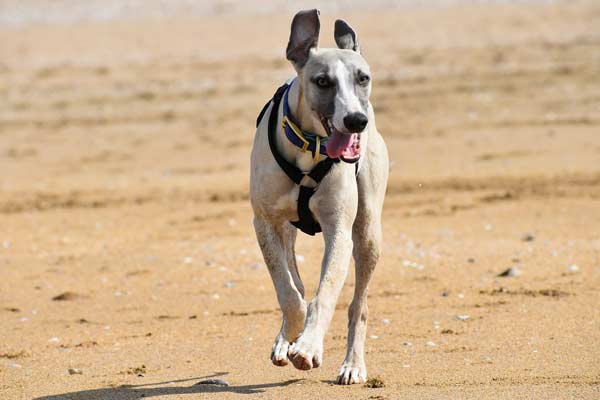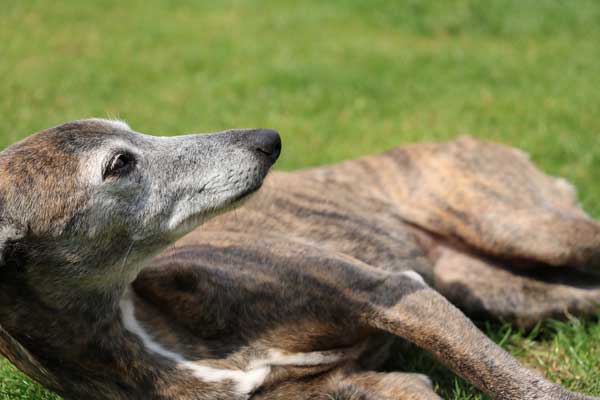Whippet Behavior Problems: How to Overcome the Most Common Challenges
Whippets are a breed of dog known for their gentle and affectionate nature. However, like any other breed, they can exhibit behavior problems that can be challenging for their owners.
A typical behavior problem in Whippets is biting or nipping. This habit often indicates being bossy and can be targeted at people or other pets living in the house.
Another behavior problem in Whippets is separation anxiety. These dogs are known for their attachment to their owners, and when left alone, they can become anxious and destructive.
Dealing with this habit can be difficult, and it might damage the home and furniture. Owners must learn how to address this behavior and provide their Whippets with proper training and support.
Understanding and managing behavior problems in Whippets is essential to ensure a happy and healthy relationship between the dog and its owner.
Common Whippet Behavior Problems
Whippets are generally well-behaved dogs, but like any other breed, they can develop destructive behavior if not appropriately trained. Here are some common behavior problems that Whippet owners may encounter:
Biting or Nipping
Whippets must learn to behave around humans and other dogs when young. If they start nipping, it usually indicates that your Whippet is trying to establish dominance over you or another pet in the house. It’s important to teach your Whippet that biting or nipping is unacceptable. You can redirect your dog’s attention to a toy or treat or use a firm “no” command.
Excessive Barking or Whining
Whippets are generally quiet dogs, but they may bark or whine excessively if they are bored, anxious, or need attention. Ensure your Whippet gets enough exercise and mental stimulation to prevent excessive barking or whining. You can also provide your Whippets with toys or treats to keep them occupied.
Separation Anxiety
Whippets are social dogs and may develop separation anxiety if left alone for long periods. Symptoms of separation anxiety include excessive barking, destructive behavior, and house soiling.
Ensure your Whippet gets plenty of exercise and attention to prevent separation anxiety. You can also leave them with a toy or treat to keep them occupied while away.
Proper training and socialization are crucial to preventing behavior problems in Whippets. It’s essential to provide your Whippet with regular exercise, mental stimulation, and a healthy diet to ensure overall health and well-being.
Health Issues That Can Affect Whippet Behavior
Whippets are generally healthy dogs, but like any other breed, they can develop health issues that may affect their behavior. Here are some common health issues that might affect Whippet’s behavior:
Progressive Retinal Atrophy (PRA)
PRA is a gene-related issue that impacts the eye’s retina, leading to slow vision loss and blindness. Whippets are among the breeds more likely to have PRA. Because of their vision loss, dogs with PRA might get more nervous and scared. Getting your Whippet’s eyes examined often by a vet is essential to catch any early signs of PRA.
Hypothyroidism
Hypothyroidism happens when the thyroid gland doesn’t create enough thyroid hormone. This can lead to different symptoms like gaining weight, feeling tired, and experiencing changes in behavior like being aggressive or anxious. It’s often seen in middle-aged and older dogs and can be identified through a basic blood test.
Arthritis
Arthritis is a condition that makes joints hurt and feel stiff because they break down over time. Whippets are a sighthound breed more sensitive to pain than other breeds.
Arthritis can cause a whippet to become more irritable or aggressive due to the discomfort they are experiencing. Proper nutrition, weight management, and exercise can help prevent or manage arthritis in whippets.
Deafness
Whippets are a breed that can be predisposed to deafness, especially if they have a lot of white in their coat. Deafness can cause a whippet to become more anxious or reactive, as they may startle more quickly due to the inability to hear what is happening around them. Having your Whippet’s hearing checked regularly by a veterinarian is essential.
Weight Gain
Whippets can quickly gain weight if they don’t eat the right food and exercise often. Obesity can cause various health problems, including joint pain, respiratory issues, and behavior changes such as lethargy or irritability.
Feeding your Whippet a high-quality diet that meets their nutritional needs and provides regular exercise to maintain a healthy weight is essential.
Whippets can develop a range of health issues that may affect their behavior.
Whippet Training for Behavior Problems
Whippets are independent, occasionally requiring additional training to eliminate undesirable conduct issues.
Proper training can help prevent and solve common behavior issues such as biting, excessive barking, and destructive chewing.
This section will discuss effective training methods to help your Whippet become a well-behaved and obedient companion.
Obedience Training
Teaching Whippets to follow simple commands like sit, stay, come, and heel is essential. This training helps you and your dog understand each other better. Start with short and easy lessons, then slowly make them longer and harder. Give treats, say nice things, and use toys to show your dog they did well.
Mental Stimulation
Whippets are intelligent dogs that require mental stimulation to prevent boredom and destructive behavior. Provide your Whippet with interactive toys, puzzle games, and regular exercise to keep their mind and body active. Add obedience training to their daily routine to challenge their problem-solving skills and improve their focus.
Positive Reinforcement
Using positive reinforcement involves rewarding good behaviors and ignoring unwanted ones. This approach is practical for Whippets since they appreciate compliments and rewards.
Offer them treats, toys, and verbal encouragement when they exhibit desirable actions, such as sitting calmly, walking steadily on a leash, and obeying instructions.
In addition to training, giving your Whippet a healthy diet is essential, as grooming them regularly and creating a peaceful and quiet environment. Refrain from harsh punishment or physical correction, which can damage your relationship with your Whippet.
These training methods can help your Whippet become a well-behaved and obedient companion. Every dog is unique; seeing results may take time and patience.
Whippet Exercise and Mental Stimulation
Whippets are known for their high energy levels and love for physical activity. Regular exercise is crucial for a whippet’s physical and mental well-being.
This section will discuss the importance of exercise and mental stimulation for whippets and provide tips on keeping your furry friend active and happy.
Plenty of Exercises
Whippets are a type of sighthound and enjoy running and chasing things. Whippets need lots of exercises to use their energy and stay healthy. If they don’t get enough exercise, they might gain weight, develop behavior problems, or have health issues.
Daily Exercise
A whippet needs at least 30-40 minutes of daily exercise but can handle much more. It’s essential to provide them with physical activity and mental stimulation.
Going for a daily walk with your Whippet is a great beginning, but they require more than that. Remember to visit a dog park, where they can freely race around and have fun with other furry friends.
Dog Park
Dog parks are an excellent place for whippets to socialize and get some exercise. However, keeping them on a leash until they are comfortable with the environment is essential. Once they are used to the dog park, you can let them off-leash and watch them run and play.
Whippets are also great at racing. If you have a whippet that loves to run, consider taking them to a racing event. Racing is a fun and safe way for whippets to exercise their instincts and burn off their energy.
Mental Stimulation
In addition to physical exercise, whippets also need mental stimulation. They are intelligent dogs who need mental challenges to stay happy and healthy. Mental stimulation can come in puzzle toys, agility, and obedience training.
It’s crucial to provide your Whippet with a healthy diet and proper nutrition to support their active lifestyle. A balanced diet will help keep them in good shape and prevent health issues.
Whippets need plenty of exercise and mental stimulation to stay healthy and happy. Regular training, socialization, and mental challenges are crucial to preventing behavior problems and health issues.
Whippet Health Conditions That Affect Behavior
Whippets tend to be healthy canines, but as with all dog breeds, they may experience specific health conditions that influence their behavior. The following are some prevalent health concerns that can lead to behavioral problems in whippets:
Mitral Valve Disease
Mitral valve disease is a common heart condition in whippets, and it can cause irregular heartbeats, coughing, and difficulty breathing.
This condition can affect a whippet’s behavior by causing them to become lethargic, irritable, and less active than usual. It can cause heart failure and other major health issues if not treated.
Bloat
Bloat, or gastric dilatation-volvulus (GDV), is a life-threatening condition that can occur in whippets and other deep-chested breeds.
It happens when the stomach fills with gas and twists on itself, cutting off blood flow to the organs. Bloat can cause a whippet to become restless, anxious, and agitated, requiring immediate veterinary attention.
Cryptorchidism
Cryptorchidism happens when one or both testicles don’t go down into the scrotum. This can make a Whippet act more aggressive and bossy, especially with other male dogs. It can also raise the chance of getting testicular cancer and other health issues.
Epilepsy
Epilepsy is a brain disorder that can make Whippets and other dogs have seizures. Seizures can change a Whippet’s behavior, making them feel lost, mixed up, and worried. They might also act more aggressively or scared during and after a seizure.
Corns
Corns are painful, hard growths that can develop on a whippet’s paw pads. They can cause a whippet to become less active and more irritable, especially when walking or running.
Corns can also cause a whippet to become more sensitive to touch and more prone to snapping or biting if their paws are touched.
Overall, it’s crucial for whippet owners to be aware of these health conditions and to take steps to prevent them from affecting their dog’s behavior.
This includes providing proper nutrition, regular veterinary care, and monitoring their dog’s behavior for any signs of illness or discomfort.






